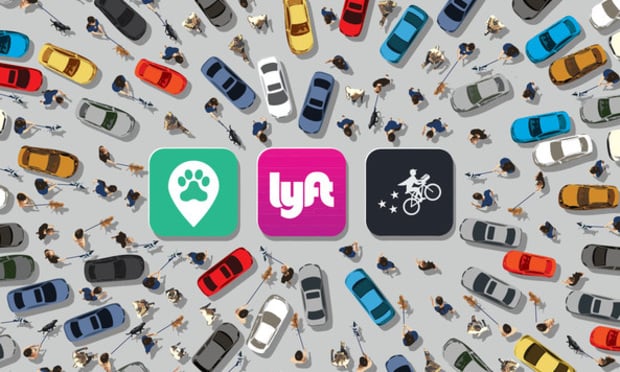Business Advocates Urge Calif. to Limit Scope of Landmark Labor Case
The decision could have wide implications for gig-economy companies and others that rely on independent contractors. "These law-abiding employers should not now face mammoth retroactive liability," Paul Grossman, general counsel to the California Employment Law Council, told the California Supreme Court.
May 17, 2018 at 01:49 PM
4 minute read

Business groups are urging the California Supreme Court to limit the scope of a recent decision that redefined the standard for whether a worker is a contractor or employee and opened a door to substantial penalties for companies.
The delivery company Dynamex Operations West Inc. and two business advocates have asked the court to not retroactively apply the decision, which set a more rigid worker classification standard that makes it harder for gig-economy companies and others to call their workers independent contractors.
The consequences of the April 30 ruling could be wide for gig-economy companies that rely on contractors, who unlike many employees are not entitled to benefits such as minimum wage, health care or collective bargaining rights. Management-side lawyers predicted a flood of litigation in the aftermath of the decision.
“Retroactive application could void existing contractual relationships statewide,” Dynamex's lawyers at Littler Mendelson and McDermott Will & Emery wrote in a petition filed this week at the California Supreme Court. “It could require relitigation of independent contractor/employee issues in administrative agencies and courts. None of this would be consistent with orderly administration of justice.”
Lawyers for Dynamex called the California Supreme Court decision “a fundamental change to substantive law.”
➤➤ Get employment law news and commentary straight to your in-box with Labor of Law, a new Law.com briefing. Learn more and sign up here.
The Employers Group, represented by Jones Day's George Howard Jr., told the court in a brief that “many California employers have relied in good faith for years if not decades” to meet the classification standards set by a 1989 case. Howard said the California Supreme Court's ruling “establishes a test for independent contractor status materially different from prior law and one which was not reasonably foreseeable.”
The California Employment Law Council, represented as an amicus by Orrick, Herrington & Sutcliffe, also asked the court for clarification.
Paul Hastings partner Paul Grossman, general counsel to the employment council, told the court in a letter that applying the ruling retroactively would “not only be unfair to law-abiding employers who based classification decisions” on the previous test, but also “to the extent that it imposed liability on such law-abiding employers.” Grossman wrote: “These law-abiding employers should not now face mammoth retroactive liability.”
Meanwhile, the on-demand food delivery company Grubhub Inc., represented by Gibson, Dunn & Crutcher, took a similar stance in resisting the push by a former worker to quickly apply the decision to a pending worker classification dispute in the U.S. Court of Appeals for the Ninth Circuit.
The worker is fighting in the appeals court to overturn a judge whose ruling in February supported Grubhub's classification of its workers as contractors, not employees.
Shannon Liss-Riordan, the Boston-based lawyer who represents the Grubhub worker, has urged the Ninth Circuit to return the case to the trial court for further review in the wake of the ruling.
“Notably, the Dynamex decision makes clear that California's adoption of the ABC test is a reinterpretation of existing law, and thus the decision will apply retroactively, including to plaintiff in this case,” Liss-Riordan wrote in a court filing on May 4.
Two new worker classification lawsuits Liss-Riordan filed against Postmates Inc. and Lyft Inc. embraced the California Supreme Court ruling.
Read more:
Grubhub Resists 'Do-Over' in Worker's Classification Case After Landmark Ruling
Three Takeaways From the California Supreme Court's Gig Economy Ruling
Calif. Embrace Employee-Friendly Classification Test. Why This Matters to Gig Companies
This content has been archived. It is available through our partners, LexisNexis® and Bloomberg Law.
To view this content, please continue to their sites.
Not a Lexis Subscriber?
Subscribe Now
Not a Bloomberg Law Subscriber?
Subscribe Now
NOT FOR REPRINT
© 2025 ALM Global, LLC, All Rights Reserved. Request academic re-use from www.copyright.com. All other uses, submit a request to [email protected]. For more information visit Asset & Logo Licensing.
You Might Like
View All
Davis Wright Tremaine Turns to Gen AI to Teach Its Associates Legal Writing
4 minute read
Husch Blackwell Hires Former Adobe Counsel to Oversee AI Advisory Offering
3 minute read
Legal Tech's Predictions for Artificial Intelligence in 2025
Trending Stories
- 1'Reverse Robin Hood': Capital One Swarmed With Class Actions Alleging Theft of Influencer Commissions in January
- 2Hawaii wildfire victims spared from testifying after last-minute deal over $4B settlement
- 3How We Won It: Latham Secures Back-to-Back ITC Patent Wins for California Companies
- 4Meta agrees to pay $25 million to settle lawsuit from Trump after Jan. 6 suspension
- 5Stevens & Lee Hires Ex-Middle District of Pennsylvania U.S. Attorney as White-Collar Co-Chair
Who Got The Work
J. Brugh Lower of Gibbons has entered an appearance for industrial equipment supplier Devco Corporation in a pending trademark infringement lawsuit. The suit, accusing the defendant of selling knock-off Graco products, was filed Dec. 18 in New Jersey District Court by Rivkin Radler on behalf of Graco Inc. and Graco Minnesota. The case, assigned to U.S. District Judge Zahid N. Quraishi, is 3:24-cv-11294, Graco Inc. et al v. Devco Corporation.
Who Got The Work
Rebecca Maller-Stein and Kent A. Yalowitz of Arnold & Porter Kaye Scholer have entered their appearances for Hanaco Venture Capital and its executives, Lior Prosor and David Frankel, in a pending securities lawsuit. The action, filed on Dec. 24 in New York Southern District Court by Zell, Aron & Co. on behalf of Goldeneye Advisors, accuses the defendants of negligently and fraudulently managing the plaintiff's $1 million investment. The case, assigned to U.S. District Judge Vernon S. Broderick, is 1:24-cv-09918, Goldeneye Advisors, LLC v. Hanaco Venture Capital, Ltd. et al.
Who Got The Work
Attorneys from A&O Shearman has stepped in as defense counsel for Toronto-Dominion Bank and other defendants in a pending securities class action. The suit, filed Dec. 11 in New York Southern District Court by Bleichmar Fonti & Auld, accuses the defendants of concealing the bank's 'pervasive' deficiencies in regards to its compliance with the Bank Secrecy Act and the quality of its anti-money laundering controls. The case, assigned to U.S. District Judge Arun Subramanian, is 1:24-cv-09445, Gonzalez v. The Toronto-Dominion Bank et al.
Who Got The Work
Crown Castle International, a Pennsylvania company providing shared communications infrastructure, has turned to Luke D. Wolf of Gordon Rees Scully Mansukhani to fend off a pending breach-of-contract lawsuit. The court action, filed Nov. 25 in Michigan Eastern District Court by Hooper Hathaway PC on behalf of The Town Residences LLC, accuses Crown Castle of failing to transfer approximately $30,000 in utility payments from T-Mobile in breach of a roof-top lease and assignment agreement. The case, assigned to U.S. District Judge Susan K. Declercq, is 2:24-cv-13131, The Town Residences LLC v. T-Mobile US, Inc. et al.
Who Got The Work
Wilfred P. Coronato and Daniel M. Schwartz of McCarter & English have stepped in as defense counsel to Electrolux Home Products Inc. in a pending product liability lawsuit. The court action, filed Nov. 26 in New York Eastern District Court by Poulos Lopiccolo PC and Nagel Rice LLP on behalf of David Stern, alleges that the defendant's refrigerators’ drawers and shelving repeatedly break and fall apart within months after purchase. The case, assigned to U.S. District Judge Joan M. Azrack, is 2:24-cv-08204, Stern v. Electrolux Home Products, Inc.
Featured Firms
Law Offices of Gary Martin Hays & Associates, P.C.
(470) 294-1674
Law Offices of Mark E. Salomone
(857) 444-6468
Smith & Hassler
(713) 739-1250






